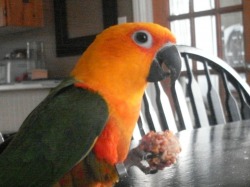Basic Bird Nutrition
Seed-eating birds
Even for seed-eating birds, seeds alone are not a proper diet. Even when multiple types of seed are offered, the seed-only diet will not supply the necessary array of vitamins and minerals that is needed for optimal health. Birds love seeds like children (and adults) love candy. They'll eat a favorite seed over what is healthy for them. The best diet for most seed-eating birds consists of pelleted foods, fruits and vegetables, and an occastional treat. Formulated diets are readily available from many reputable manufacturers, pet stores, and veterinarians. The food is a blend of grains, seeds, vegetables, fruits, and various types of proteins, as well as additional vitamins and minerals. The ingredients are mixed and then baked. The food may be in the form of pellets, crumbles, or nuggets. Unlike a seed mixture, the bird cannot select particular components out of a formulated diet, so nutritional imbalances are much less likely to occur. There are commercial foods for different species, so be sure to select one appropriate for your bird. Some have higher fat levels for many of the macaws and Golden conures, whereas others may be lower in fat and higher in protein to provide better nutrition for cockatoos and Amazons.
Fruits and vegetables are a good source of vitamins, minerals, and carbohydrates. Wash all fruits and vegetables thoroughly before feeding. Remove the pits and apple seeds from the fruit. Any fruits and vegetables left uneaten should be discarded daily so spoiling is not a problem. Because fruits and vegetables are high in water content, the urine portion of the droppings will increase.
Non-seed eating birds
Diets for non-seed eating birds such as Lories and Lorikeets consist of a commercially prepared formula. Some of these may be fed dry or moistened; others need to be made into a solution and fed as a nectar. The nectar will need to be replaced several times daily; every 4 hours in hot weather. The diet should also include some fruits such as: apples, pomegranates, papaya, grapes, cantaloupe, pineapple, figs, and kiwi. Pollen, corn-on-the-cob and some flowers such as pansies, nasturtiums, roses, hibiscus, marigolds, and dandelions may be offered, as well.
Foods to Avoid
Some foods are on the do-not-feed list. These include foods that contain high amounts of sugar or fats (junk foods: potato chips, doughnuts, etc.), avocado (guacamole), chocolate, alcohol, or caffeine. Do not give fruit pits. Persimmons are also on the do-not-feed list.
Grit
While not a food, grit is something people think all birds need. They don't. If it is overeaten, grit impaction can occur in the digestive system. Finches and canaries may benefit from a couple of grains of grit every couple of months, but most budgies, cockatiels, and other parrots do not need it.
Dr. Foster & Smith
A few points to remember

- Feed around 5-6pm
- Clean food dishes out with hot soapy water twice a day
- Pellets are a GREAT food choice (i recommened ZuPreem)
-fruits and veggies should be offered at least once a day
